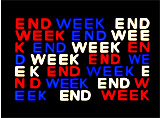
|
Week End (1967, Fr.)
In director Jean-Luc Godard's prescient and politicized
black comedy and road movie - a philosophical and confusing critique
of the bored and selfish bourgeoisie; it was an allegory about the
breakdown of society; its title derived from the time-frame of the
film involving an upper-class, bickering murderous Parisian couple
on a weekend trip; the film was controversial for displaying many
taboos, including patricide, rape, immolation, animal cruelty, and
cannibalism:
- the introduction of the two main detestable, bickering
characters on an outdoor apartment balcony: affluent, shallow,
and self-centered Parisian Corinne Durand (Mireille Darc) and her
greedy husband Roland (Jean Yanne); both had contempt for each
other - the two venal marrieds both had other lovers and were secretly
plotting to murder each other; and both were about to take a weekend
car trip to her parents' place in Oinville to visit her dying father
and ensure the acquisition of inheritance money from him (they
had been slowly poisoning his food for five years)
- the parking lot accident sequence (viewed from above),
when a cheaper blue car and an expensive red car had a minor collision;
the incident escalated into a major fist-fight and confrontation
between the two drivers - a foreshadowing of what was to come
- the lengthy sequence of a sexually-graphic "orgy" or
"menage a trois" monologue (with loud organ music accompaniment
often drowning out the most provocative and offensive words); Corinne
was obscured by being silhouetted and dressed in her panties and bra
and sitting on the edge of a desk, offhandedly and monotonously describing
to her fully-dressed husband a recent bizarre orgiastic sexual encounter;
he was play-acting a counselor/analyst as she presented her story with
a disinterested tone; it was a threesome between a couple (Paul and
his wife Monique) and Corinne that was explicitly detailed (as the
camera shifted left and right, and zoomed in and out); she hesitantly
described the perverse sexual encounter involving food and sex (foreshadowing
a more depraved sex act of rape in the film's finale); she described
the three ending up in the kitchen, with instances of oral sex, masturbation,
intercourse, the cracking of an egg between buttocks, and the act of
sitting naked in a cat's bowl of milk; afterwards, she was asked by
Roland: "Is this true, or a nightmare?", Corinne responded: "I
don't know," and he replied: "I adore you, Corinne. Come
and work me up"
- the additional sequence of a minor car accident, titled "Scène
de la Vie Parisienne," when Roland and Corinne's black Facel
convertible backed into the parked Dauphine of a young boy's parents
in a nearby house, and dented the bumper; dressed as a Native American
chief (with a toy bow and arrow), the boy immediately protested the
crash (but pocketed a bribe), soon followed by both of his parents,
including his mother who was hitting tennis balls at the couple (fended
off with a paint-gun), and his father who wielded a shotgun; the
boy shouted: "Bastard! Shitface! Communist!"
- the sequence of their blockaded weekend journey to
Oinville in their convertible Facel-Vega (a French automobile) began
on a Saturday morning. They encountered a bizarre, mammoth, and epic
traffic jam on the two-lane roadway littered with stalled or abandoned
cars, with many occupants (mostly children) of the emptied cars
walking on the side of the road. The unfazed and uncaring couple
mysteriously and non-chalantly sneaked through by passing everyone
in the open left lane, although some protested against their cutting
ahead.
- there were views of people card playing, tossing
a beach ball, book-reading, engaged in a chess match, arguing,
listening to a radio, sleeping, and urinating. Also, there was
the sights of a traveling menagerie of caged monkeys, lions, and
a llama. They passed a bus, a horse pulling an open load of manure,
a gigantic red and yellow Shell Oil tank truck, and a sailboat.
- during the lengthy almost 8-minute long tracking
shot (the longest of its kind at the time, moving in a parallel
track along the roadway), they came upon more battered, wrecked
burning cars, and mangled, mutilated bodies and bloody casualties
at the front of the traffic jam. At the end of the long string
of cars, they turned right onto a rural road. However, they came
upon more surrealistic and nightmarishly apocalyptic images and
examples of social unrest and catastrophe in a small town and in
the countryside - more collisions and bloodied or dead people.
|
The Epic Weekend Traffic Jam
|
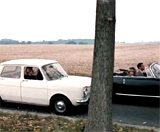
Passing All Cars on the Left
|
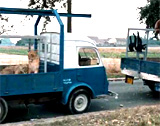
Caged Animals
|

The Mammoth Traffic Jam
|
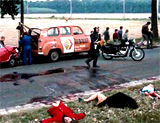
Casualties
|
- .the class struggle, presented
with the image of the body of handsome, but dead young rich man Paul
in the front seat of his Triumph sports car that had crashed (off-screen)
into a working-class man's tractor; his surviving companion, a blood-soaked,
green-sweatered young bourgeois woman named Juliet (posing before
an advertising billboard), was devastated, and she chastised the
farmer with insults:
"You killed the man I loved! Why didn't you stay in your stable?";
she was reprimanded: "Why drive so fast? This isn't St. Tropez!";
she yelled back to him and a group of lower-class workers standing
in front of a wall plastered with posters: "You can't bear us
having money while you haven't, can you? You can't bear us screwing
on the Riviera, screwing at ski resorts. Can't bear us chucking cash
around all year while you can't!"; when Corinne and Roland refused
to help them and drove off, Juliet yelled after them: "Jews! Dirty
Jews!"; the worker and the bourgeoisie woman and other onlookers
united for a portrait-photo (including Roland?), after which the French
national anthem was played - the title screen read: "Phony-Graph"
- the scene of the hijacking of Roland and Corinne’s
car by a pretty, red-rain-coated female hitchhiker, and gun-brandishing
Joseph Balasamo ("The Exterminating Angel"); jammed into
the back seat, he claimed to be the product of sex between God and
Alexandre Dumas; the obnoxious hitchhiker exclaimed: "I'm here
to inform these Modern Times of the Grammatical Era's end, and the
beginning of Flamboyance, especially in cinema" - an apt description
of the film itself; Balasamo offered Corinne and Roland whatever
they wanted in return for a ride to London, and to prove his miraculous
powers, he magically conjured up a white rabbit under the dashboard
("Oh s--t, a miracle!")
- to absurd heights, Corinne and
Roland offered their materialistic wish list: a big Mercedes sports
car, an Yves Saint-Laurent evening dress, a Miami Beach hotel, a
headful of natural blonde hair, a squadron of Mirage IV aircraft,
and a weekend with James Bond, but the hitchhiker refused their requests
("You creeps, I'll give you nothing") and called them "assholes";
Corinne grabbed the gun, and the two hitchhikers were chased across
a field littered with discarded crashed cars, with the miraculous appearance
of a flock of sheep (a reference to the end of Luis Bunuel's film The
Exterminating Angel (1962, Mex.)
- the shocking scene of the fiery crash of the couple's
car after instances of reckless driving, when the film jumped its
sprockets, and the two were caught in the car engulfed in flames
and smoke; Corinne cried out: "My Hermes handbag!"
|
Surreal or Unusual Occurrences
|

|

|

|
|
A Live Rabbit Pulled From Under a Car Dashboard
|
A Yellow Telephone Booth Conversation Sung in
Intoned Verse
|
A Squirming Earthworm
|
- and their unusual encounters with:
- a young man (Jean-Pierre Leaud) in a yellow phone booth singing
his conversation, who defended himself when the couple tried
to steal his car
- the two literary figures of Tom Thumb and English poetess Emily
Bronte (looking like Little Bo Peep) reading a book - a whimsical
sequence; horrifically and violently, however, they set her dress
set on fire and she burned to death on the ground, as Roland spoke:
("It's
rotten of us, isn't it?...Can't you see they're only imaginary characters?")
- the image of an earthworm squirming on the ground,
as Roland and Corinne mused self-analytically: "We know nothing...We're
totally ignorant of ourselves. We're totally ignorant of what this
worm is. We're both enigmas. Anyone who denies it is the most ignorant
of all"
- the scene of the outdoor piano-recital/concert at
a farm courtyard where the circular camera turned 360° twice
around a farm courtyard, alternating one way and then the other,
as a pianist (Paul Gégauff) played Mozart’s Sonata No. 19 in D-major on a grand
piano (with a conspicuously displayed brand name - Bechstein)
- the sequence of three boring political speeches or
monologues about Marxist philosophy delivered by two sandwich-chewing
trash collectors, both immigrant workers - one from the Congo (Mon
Frère
Africain (Omar Diop)) and one an Arab (Laszlo
Szabo) - the discourses included talk of revolutionary violence by
the oppressed to obtain liberation, and the denouncement of oppressive
Western imperialism in Africa. The camera focused in the first two
speeches on the non-speaking worker, and in the third speech on Corinne
and Roland in the audience
- after the couple hitchhiked to Oinville, the prudish
in-joke scene of Corinne discreetly taking a bath below an erotic
painting - the breasts of the painting's female were clearly visible,
but Corinne's real breasts weren't in plain view
- the film's brutal outdoor terrace strangulation (by
Roland) and stabbing-murder (by Corinne) of Corinne's
mother who was carrying a flayed rabbit from the butcher shop; (Corinne's
father had died and left everything to the wife, and she refused
to split her 100% share); the murder scene paid homage to Hitchcock's
famous Arbogast murder scene in Psycho (1960) with repeated
knife-wielding stabbing; it was juxtaposed with the sickening and
gruesome view of the rabbit being doused by her spilled blood as
she screamed - followed by their criminal plot ("the
perfect crime")
to hide the cadaver by stashing it in a crashed vehicle (and plane)
along the road and setting it on fire
- the hostage-taking of Roland and Corinne (and others)
by a group of gun-toting revolutionary, hippie terrorists led by
Le Chef du Front de Libération de la Seine et Oise (Jean-Pierre
Kalfon), the FLSO, who believed in radical Marxist politics; at the
group's outdoor base camp where the hostages were brought, the cook
Ernest (Ernest Menzer) (with a blood-stained white gown and a large
butcher knife) was told: "You can screw her before eating her,
if you like"; the anarchists communicated by radio with film
title code names, such as: "Battleship Potemkin calling The
Searchers"
- the sequence of the sexual torture and rape of one
of the stripped, captive female hostages, an English tourist, before
the cook planned to prepare her for the meal; with her open thighs
before him, he ritualistically cracked two eggs onto her crotch (as
a garnish) and inserted (off-screen) a large dead fish into her vagina
(it was regarded like a pig's mouth with an apple) instead of his
own phallus; it was a nightmarish re-enactment of the film's earlier
kitchen-counter sex orgy
- Roland's murder (off-camera with a slingshot) when
he tried to escape, and his subsequent disembowelment: ("The
horror of the bourgeoisie can only be overcome by more horror")
- the disturbing unsimulated sequences of Ernest's gross
slaughter of a pig and a live goose
- the scene of the murder of the group's girlfriend
Valérie (Valérie Lagrange), who was fatally injured
in a shootout; with blood streaking down onto her face, she sang
a childish song about being isolated as she perished: "How happy
I'd be if you knew, You, who I'm leaving tonight. That though it
seems everything's through, To others it seems it's all right. A
smile, though the heart may be torn, Pretend that it's not past mending,
Write the last word, so forlorn. Just a novel with an unhappy ending"
- the film's last scene after Corinne had joined with
the leader following Valerie's death; she feasted and chewed on the
meaty stew, created by Chef Ernest from Roland's flesh/bones and
the remains of other hapless hostages: (Corinne: "Not bad." Le
Chef: "Yes, we mixed the pig with the remains of the English
tourists." Corinne: "The ones in the Rolls?" Le Chef: "That's
right. There should be left-overs of your husband in there, too." Corinne: "When
I'm finished, Ernest, I wouldn't mind a bit more")
- the film ended with two different title cards: "End
of Story" (Fin de Conte) and "End of Cinema" (Fin
de Cinéma).
|
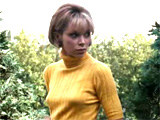
Corinne Durand (Mireille Darc)

Parking Lot Accident

Monologue About an Orgy


A Second Car Accident



Class Struggle Symbolized by Crash of Tractor Into Sports Car

Posing For Photograph
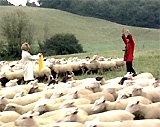
Transformation of A Field of Crashed Cars Into a Flock of Sheep

Their Own Car Crash
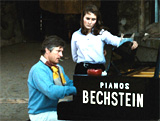
Mozart Sonata
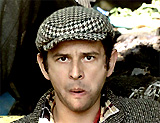
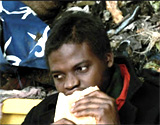
Two Migrant Workers Delivering Speeches
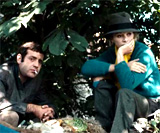
Roland and Corinne

Corinne Bathing
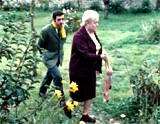
Corinne's Mother with Skinned Rabbit - Just Before Her Own Strangulation
and Stabbing-Murder
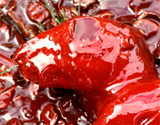
Rabbit Doused in Mother's Spilled Blood
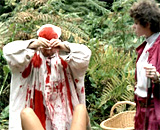
The Brutal Anarchist Rape Scene - Opened Thighs of Female
Hostage

Corinne Taken Hostage

The Death of Roland
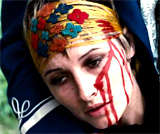
The Death of Chef's Girlfriend Valerie

Corinne's Cannibalistic Appetite for Her Own Dead Husband

Ending - Title Card
|

























